Web.03 – What You Need To Know
An epic change is coming, and it’s as epochal as the birth of the automobile. Some think the technological revolution already began years ago, but that’s outmoded thinking. The internet is in perpetual flux, and what we’re accustomed to is set to transmute majorly. Moreover, it will restructure society. It’s called Web.03. While you may think from the description that it’s just an update of the internet as we know it, you’d be wrong. It’s the internet as it was always intended, before the greedy tech titans stole it from us. Much of it sounds utopian. Many futurists envisaged the internet as a force for good. By and large, their vision was wrong. But maybe it wasn’t. We explore Web.03 and how it will revolutionise our lives online and offline. It’s a lot to take in. So, strap on your VR headsets, because here we go!
Before We Get To Web.03
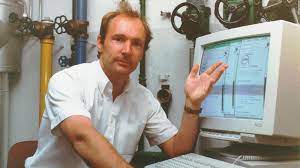
Before embarking on a sermon about how Web.03 will transform our lives, we must understand what it is. In doing so, we best conceptualise it in context with what’s come before. The past two incarnations of the Net were Web.01 and Web.02. We’ll start with the World Wide Web. Tim Berners-Lee is the English computer scientist credited with inventing the WWW. He began work on it in 1989. Up until then, what constituted the web was an archaic post-war computer network mostly utilised by boffins. Back then, scientists, academics, banks, etc., communicated via cumbersome code through numerals and complex commands. But Berners-Lee had a vision. His challenge was to recalibrate the masses of code so that the web could become accessible to all. Having achieved his goal, users slowly utilised the web by the early 1990s. At first, it was as passive consumers of information.
Web directories appeared along with the early browsers. The internet was now more easily searchable. Users visited bulletin boards and early websites. Their interaction was minimal. As more and more users joined the web, the browser wars kicked off. Rising search engines like Yahoo, Compuserve, and AOL soon asserted themselves. In those days, the platforms were built upon desktop computers. By Web.0.2, the platform was constructed on the Web itself. Instead of content being built for them, users were able to create content themselves. Social networking sites arose, along with chat groups, video-sharing, and blogs. Traditional media soon came under threat as advertisers migrated to the web. Retailers eagerly followed. The hardest hit were newspapers and free-to-air television, which lost their financiers to the new technology. Users switched online for their news, which was disseminated through social networks. Digital technology rapidly converged, and mobile phones came to incorporate web browsers.
From Web.02 To Web.03
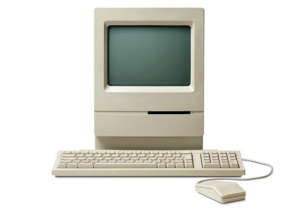
Bear in mind that there is no ultimate authoritative source for these definitions. Over time, academia interpreted them and defined them relative to their innovativeness. You may find timelines that state Web.01 as occurring between 1991-2004. We call this the period of the user “consumer”. Pages were static and hyperlinked; there was no user interaction. This isn’t necessarily correct, since interfacing was definitely happening with blogs and chat groups by at least 2000. At one point, Yahoo Groups had a phenomenal user base. It was possible to set up a group on any topic and garner contributors from around the world. However, in rough estimations, it’s a satisfactory timeline to locate these stages of development. We can comfortably set the start of Web.02 at 2004, when Flash and Java scripts added new and innovative features.
By 2004, the information stream was no longer one way. Hitherto, the user took information from the web. The web then began extracting information from users. The transfer of data moved in both directions. As we Googled topics and interacted on Facebook, centralised companies stored our data. They studied that data to learn about us, so that they could serve us content. These companies made money off users the longer they were on their sites. By this time, they realised they had a valuable trove of data on users, which they sold to advertisers. This is where we elicit our definition of Web.02, as targeted advertising crept in. The dystopian predictions of the WWW came true. Not only did users lose privacy with corporations mining our data, but governments assessed that data. We were already on the road to a surveillance state, but Web.02 sealed our fate.
The User Is Data
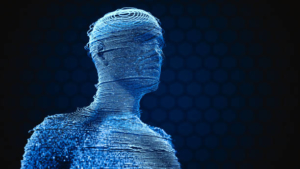
Another major feature of Web.02 is apps. The internet is awash with applications. Twitter and Facebook represent two of the most well-known apps. However, the proliferation of apps is a defining feature of where we’re at in Web.02. They’ve become incredibly powerful, not only in a social context, but also commercially and politically. These apps target us according to our taste in consumer products, ideologies, and search patterns. The apps’ algorithms determine what content we’re fed. They even recommend friends they believe are compatible with us. This is through the information we gave them. But then there’s the information we didn’t know we gave them. Remember this, because the basis for Web.03 derives from here. The companies know where we eat, the venues we frequent, and where we buy our groceries. Likewise, they know if we’re married, own a pet, and what kind of car we drive.
The most disconcerting power these companies possess is their predictive capabilities. Not only do they know what we do, but they can also foresee what we will do. They know a woman will become pregnant before she does. They achieve this supremacy because of her consumer data, along with other factors. The information doesn’t come solely from the subject, either, but from those in her household. The metadata takes into account the data in its entirety, not that which readily relates to the individual. Peripheral data enables them to paint a consumer’s picture bit by bit. They target us with advertising according to the profile they’ve made of us. For instance, if you search a brand of TV online, expect a barrage of spam from retailers plugging deals on HD sets. Whenever you tap on and off anywhere, your profile expands. You are information and valuable information at that.
Web.03 & The Blockchain
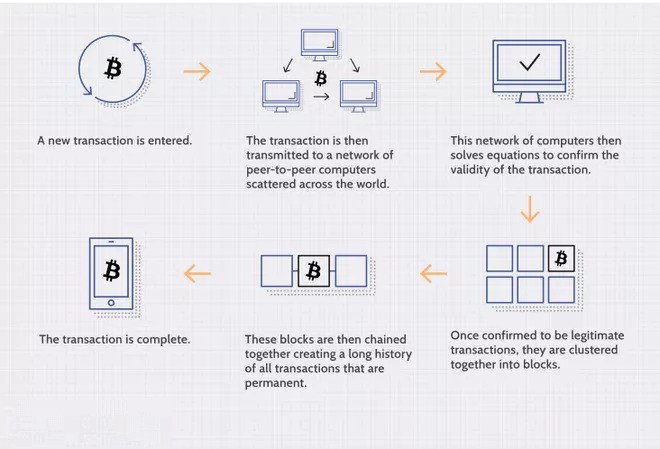
The keyword for Web.03 is decentralisation. This means privacy and freedom to travel the web unmolested. We will trade online without monitoring our transactions. Better yet, it’ll pull the rug from under the tech giants and the monopoly they hold. However, the implications go far beyond any of this and are all positive. Perhaps the dystopian commentator did not correctly predict the path of the internet. A technological revolution is afoot greater than simply connecting all the computers. It begins with the blockchain. The blockchain is an enormous topic, as are most of those broached, but we’ll describe it in the simplest terms. Currently, information is stored online in centralised locations. Google stores our information, as does the government and banks, etc., in databases. If you take the tech giant, Google, you can appreciate the amount of information they hold in one place.
Their databases store information in tables, while the blockchain sorts it into blocks. Once filled, the block is added to another block, forming the chain. Instead of holding the information in a central location, it is stored in a concatenation of blocks. Each block has been time-stamped and saved. Whenever new data comes in, it’s entered into a fresh block. This is huge, since the information exists in a free-spanning network and isn’t hoarded in one vulnerable location. And no single person or group of people has control of the data. Because of its nature, there is no room for fudging figures: the data is immutable and cannot be reversed. The alternative is the warehouses of servers that companies use to store data. Because they’re in one location, they become a “point of failure”, since their collapse can take out all the information. The blockchain is therefore infinitely more secure.
Decentralised Autonomous Organisations
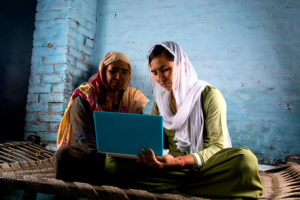
We have lived forever with the hierarchical structure of corporations. These are based on a downward-command structure, with one person or a few people seated at the top. When creating organisations on the blockchain, that rigid order disappears. Likewise, the inequity of wealth distribution vanishes along with the corporate structure. Welcome to the Decentralised Autonomous Organisation, or DAO. Let’s say we form a collective based on real estate (it’s already happening). We want to buy a whole block of land and develop it. Instead of a corporation coming in and purchasing the vacant lot, we all own a share. We buy in tokens, and those who amass the most tokens get to vote on what happens with the land. Each owner of the blockchain becomes a shareholder. When we sell the developed lot, the profits are distributed to token holders.
The network is built upon the users, and those bringing in new users are rewarded with tokens. As the network builds, power is shared among the community. Imagine the implications! The nature of the DAO could be anything. And as you see, we’ve disposed of the loathsome CEO. If we take another example, one involving the distribution of information, this means an end to censorship. On a new platform created in this fashion, you can no longer influence elections. But the blockchain, taken to its most advanced, may see the end of politics as we’ve been taught. Because the blockchain model has made the tech oligarchs obsolete. And that’s the nuts of the Web. 03, it won’t happen all at once. Instead, it will be a series of ideas that grow together until the legislature disassembles centralised companies like Facebook and Google. Decentralised, unregulated DAOs will replace them.
Taking Back Our Privacy

On the internet, your personal information is bandied about like a copy of Playboy. So many eyes pass over it, and it passes through so many hands, so to speak. Whenever we transact online, whoever we discharge with knows a little about us. For one thing, they have our immediate personal information, such as our credit cards and contact details. When we travel the internet, our real-world identity is 100% connected to us. Not so on the blockchain. On Web.03, we take back our personal information and, with it, our privacy. Anonymity becomes ours for keeping, since we’re no longer trading with a centralised bank. Instead, we keep our cryptocurrency in wallets. Take Metamask and Trust Wallet, for example. These allow the user to access applications from anywhere, without being required to hand over sensitive personal information. And while our cryptocurrency transactions are recorded, our data isn’t.
These transactions constitute contracts that won’t need corporate or government approval. In one stroke, we’ve removed the probing nose of the oligarchs and the feds. Additionally, we’ve ended the tech monopolies. No more shutting down competitive sites, cancelling users, or promoting a single ideology. There are not only financial rewards, but also social gains. We are in the realm of what’s known as DeFi, or decentralised finance. While the WEF waxes lyrical about “resetting” the global economy, they say DeFi is legitimately altruistic. Charities already use blockchain to empower people in developing countries. People in developing countries without access to finance will benefit enormously from DeFi. Charities are already operating globally to finance individuals and others to build livelihoods. They pay back the charity once they’re stable. This is the polar opposite of how banks and governments operate.
More To Come
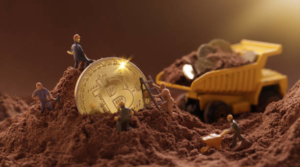
Many people simply think of the metaverse when the subject of Web.03 arises. We covered the metaverse in a recent article. While Facebook founder Mark Zuckerberg’s vision, Meta, is the play-end of the spectrum, the metaverse is much more. However, we’ve barely touched on Web.03. We’ve merely given an outline of how it functions and laid out its advantages. At the base of this brave new internet is the currency that we’ll trade in: cryptocurrency. This is a whole topic, and what we’ll be covering next in this inspired series. In the third part, we’ll explore how Web-03 will impact the real estate industry. But as you can see, you need to see the mountain before you can climb it.
Conclusion
We are far from reaching our conclusion. When we do, we’ll assess the merits of Web.03 as they relate to the real estate industry. But what we see already excites us with its myriad possibilities. Web.03 promises a fascinating new world. We have surrendered our privacy to digital technologies and, in doing so, left ourselves wide open. But we can’t take all the blame: governments and greedy tech giants have forced this upon us. In the end, we just want to live our lives with the least amount of stress. A new internet suggests a new home, while we sell off the old. Speaking of which, if you are currently selling off your home, contact Perfect Agent. We’ll bring you back to the present reality and pair you with a real-life real estate agent pro bono. The future will wait for us right where we left it.




